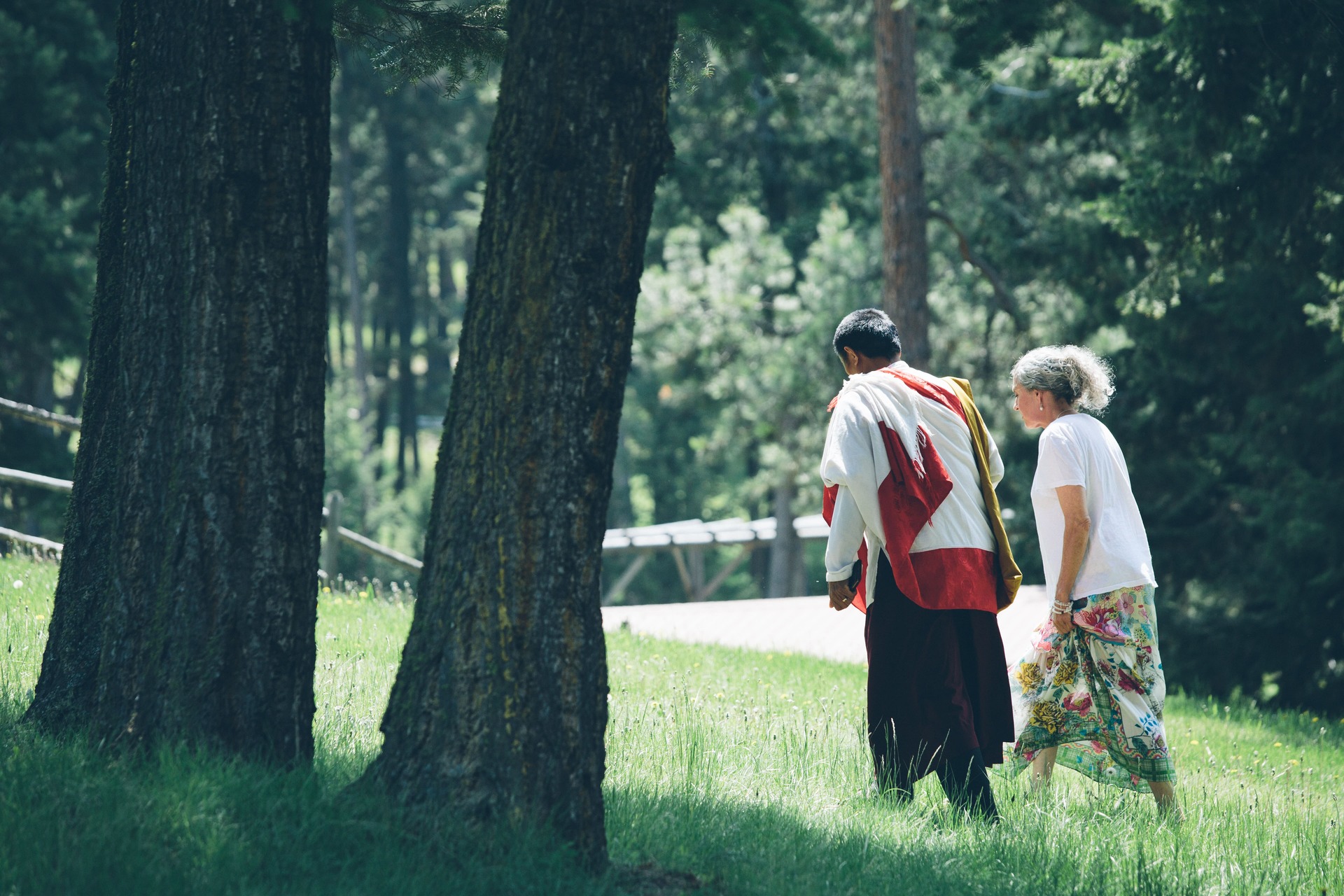Stepping into Meditation and Community
Have you wanted to try meditation as a method to increase calm and focus but find that it’s difficult following through? Is your mind convincing you that meditating is not as important as everything else that’s going on in your life?
In our busy lives, sometimes it is challenging to prioritize a meditation practice. We are not taught to “just sit there.” Many of us are constantly on the move with a never-ending to-do list.
But just think— how would your life change if you did make a shift into more intentional stillness? What would it feel like to experience the joy of just being? How would your relationship to yourself and others change if you were able to cultivate more presence and compassion?
Our “Stepping into Meditation and Community” course offers an opportunity to support you in exploring these questions. This is an online, interactive, eight-week course that will guide you to the most present, compassionate, and connected aspects of yourself. Through inner exploration and engaging with community, you will learn accessible, time-tested Tibetan Buddhist practices that will allow you to awaken into deeper peace, joy, compassion and balance in three spheres of engagement in your life: personal, community, and the world.

Who is This Course For?
The content covered in this course will provide a foundational framework for Namchak practices, culture, and sangha (community) skills. This course is a great starting point for those who are just stepping into meditation and Namchak and want to create the habit of a daily practice, supported by others doing the same. This is also a great place to start for the more experienced practitioner who is looking for connection with the Namchak Sangha.
We hope you will join us in this beneficial endeavor that has the wonderful potential for positively impacting your personal life, your community, and the world.
If it is possible, we also encourage you to invite local friends, family members, partners, neighbors, and co-workers to take this course with you. We are hoping to support you in cultivating a local Sangha and creating a weekly ritual of joining this class together in a shared space!
You can sign up to receive updates and announcements for Stepping into Meditation and Community below!
What Will Students Learn?
Shamata: a technique used to develop our power of attention and bring our thoughts to a peaceful state. Then we practice resting the mind in that state which feels like a vacation for our often scattered and distracted minds.
Loving Kindness: a practice that focuses on developing feelings of goodwill, kindness, and warmth – not only towards ourselves, but also others.
Shamata: a technique used to develop our power of attention and bring our thoughts to a peaceful state. Then we practice resting the mind in that state which feels like a vacation for our often scattered and distracted minds.
Working with our practice through the lens of the three spheres of personal, community, and world.
Course Details and What to Expect
The purpose of this course is to support us in coming home to our truer selves—the most present, compassionate, and connected parts of ourselves. We will learn accessible, time-tested, and lab-tested Tibetan Buddhist practices that will allow us to awaken into deeper peace, joy, compassion, and equanimity in three spheres of engagement in our life: personal, community, and the world. The content covered in this 8-week course will provide a foundational framework for Namchak practices, culture, and sangha (community) skills.
This course happens three times a year, with the next course beginning in March of 2024. We will meet online weekly for eight consecutive 90-minute sessions. Each session will be facilitated by a Namchak staff member.
This course will be delivered online via Zoom. The Zoom link will be provided upon registration, and a reminder email will be sent out each week with the login info. Please note: Confirmation emails from Eventbrite often end up in spam/promotions tab. Please check there if you do not see the confirmation email with the Zoom info
Course Outline
An 8-Week Course
● Week 1: Course Overview, Intention Sharing & Community Foundations
● Week 2: Four Noble Truths, Intention Deepening & Mindful Body Scan
● Week 3: Introduction to Shamata and the Six Perfections
● Week 4: Shamata Review, Mind of the Meditator & Working
● Week 5: Loving Kindness Practice Starting with Ourselves With Obstacles to Our Practice
● Week 6: Introduction to Tonglen- A Compassion Practice of Giving and Receiving
● Week 7: Engaged Bodhicitta: Exploring our Work in the World
● Week 8: Bringing it All Together & Carrying the Gems Forward (Course Conclusion)
● Week 9: Optional Learning Circle Transition
Course Details + Registration
Our next course will begin in March of 2024.
You can sign up to receive updates and announcements for
Stepping into Meditation and Community below!
Invite a Friend!
Sangha or community, is one of our favorite elements of the Buddhist path. That’s why we’re happy to share that when you register for the Stepping into Meditation and Community 8-week course, you can bring a friend, family member, or loved one to the course for free! Upon registering for the course, you’ll receive a discount code via email (don’t forget to check your spam folder) for your guest to use for free registration.
They simply have to register for the course through our website and use the promotional code you received in your email to attend the course for free. We look forward to seeing you and your friend at our next course! Please email [email protected] if you have any questions.
Tuition
Our intention is to make this workshop financially accessible to all, so we offer a tiered fee structure. When registering, please choose whichever level works best for you.
If program costs present a financial barrier or you are interested in a stipend to offset the cost of childcare, please contact [email protected].
Frequently Asked Questions
This course is online. Will the sessions be recorded?
These sessions are not recorded, since a large portion of class time is dedicated to personal check-ins and small and large group discussions. Students are encouraged to attend ‘live’ to gain the most benefit from this community-building format.
Do I need to be an experienced meditator to take this course?
This course is designed to introduce students to foundational meditation practices in the Namchak tradition. Therefore, one does not need to have any experience meditating to take this course.
Will we be practicing meditation in the sessions?
Yes. At each session we will practice together anywhere from 5-15 minutes and reflect on our practice through journaling and small/large group discussion.
What are the benefits of meditating with others?
There are three components within the heart of Buddhism: Buddha, Dharma, and Sangha. Together, they are known as the three jewels. While all three of the jewels are essential on the Buddhist path, at Namchak we bring a special focus to the jewel of the Sangha, or community. Practicing with others gives an opportunity to take our practice off of the cushion and learn how to incorporate it into our interactions with others.
What is the difference between the Stepping into Meditation program and Introduction to Meditation?
Introduction to Meditation is a 4-week program that focuses on the practice of Calm Abiding. Each course session is led by Justin Kirkwood and will offer a blend of teaching instruction and ample time for meditation practice. Stepping into Meditation and Community is a 8-week program intended to introduce a variety of practices including Calm Abiding, Tonglen or Compassion meditation, and Loving Kindness practice. The course is led by a live facilitator, each session is a blend of teaching, with ample time for community discussion. Students spend time in each course session practicing meditation.
Our Community Commitments
In order to co-create a brave, inclusive, anti-oppressive and learning centered space, in our community we each agree to:
- Be inclusive of diverse opinions and backgrounds through treating each other with respect and appreciation.
- Commit to words and actions of non-harm within our group interactions.
- Learn by immersing in and committing to the practices at hand.
- Hold personal sharing in confidence.
- Be present, practice mindful listening, and not offer unsolicited advice.
- Allow and invite for equal sharing of voices as well as the right to pass.
- Take care not to speak for others in the group.
- Assume good intent and come from a place of curiosity and care.
- Come as we are with permission to be “raggedy.”
- Be mindful of and take personal and collective responsibility for our own biases including the use of language that may “other,” “cancel,” or dehumanize any person, groups of people, and/or their experiences.
- Ask for consent before hugging or initiating physical contact during in-person gatherings.
- Use the “Ouch/Oops” tool to address hurtful comments and language in the moment and to allow space for repair.*
*Ouch/Oops . This is a tool for addressing hurtful comments/language in the moment. If someone says something hurtful, anyone can bring attention to it in the moment by saying “Ouch” and then explaining what was hurtful. If it is a word choice issue, be sure to give the first speaker the chance to rephrase and try again (remember, it’s okay to be raggedy, and we are all assuming good intent!) When someone says something that comes out wrong or hurts someone else, they should start with “Oops” – first, acknowledge the impact of their words, and then try again. This can also be done outside of the event if someone feels an “Ouch,” but does not feel comfortable sharing it with the group at that time. We aspire for this Sangha to be a place of refuge.
Meet Your Instructors!
 About Rachel Ashley:
About Rachel Ashley:
Rachel has been working with Namchak since 2017, serving on the Community Advisory Board before moving into her current position as the Community Steward. Before her role with Namchak, she worked as an educator in a variety of settings for over 15 years with elementary through college-aged students teaching English, Language Arts, dance, movement, mindfulness, and meditation. Her enthusiasm for teaching inspired her Education degree from Ithaca College, her Master’s degree from Northern Arizona University, as well as her training in various mindfulness and meditation programs over the years. Her exposure to spiritual practice and Buddhism started at a young age from the inspiration of her mother and time spent in nature. It wasn’t until after college that Rachel attended her first Buddhist retreat, which completely changed the direction of her spiritual path. Since then, she has been studying the Dharma and considers herself a devoted Vajrayana practitioner.
 About Emily:
About Emily:
Emily has been a student of Namchak since 2018. She has enjoyed contributing to many Namchak endeavors over the years, including serving on the Community Advisory Board and assisting in the creation of the Compassion in Action Network. Now, Emily serves as the Community Engagement and Programming Specialist, supporting students across all Namchak offerings. Prior to her current role with Namchak, Emily worked as a research coordinator at the University of Pennsylvania, conducting clinical research on anxiety, depression, and PTSD. Emily’s passion for mental health led her to Temple University, where she obtained her Bachelor’s degree in Psychology. Today, she is an enthusiastic practitioner who enjoys cultivating sangha (community) and deepening into Vajrayana wisdom and practice.
